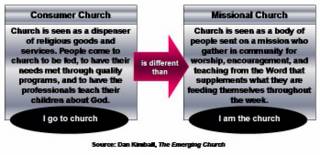I recently had an opportunity to experience Northeast Ohio’s latest shopping phenomenon, Legacy Village in Lyndhurst. It was truly amazing—the latest venture in our continuing fascination with consumerism in America. It was basically a very upscale mall, but designed like a little village, with quaint streets and nice sidewalks (which will be heated during the winter). Stores like Crate and Barrel (the first in Ohio) were there, as were unique stores like the huge sports store complete with a four-story high climbing wall. The Cheesecake Factory was there along with several other rather nice restaurants. As soon as it opened, it became the Jerusalem or Mecca for shoppers, making their pilgrimage to the latest shrine of consumerism.
As we were arriving, we walked alongside the very nicely designed buildings, looking up at the attention to detail. Somebody joked that their new church building was designed based on the elaborate model before us. We all laughed, knowing that we could never afford the designers that put this incredible thing up. But hidden in that comment was something very real and disturbing: have we in the church been sucked into a consumerism approach to ministry?
Have we redefined “church” as a consumer-friendly building, consumer-friendly programs, consumer-friendly preaching, consumer-friendly activities?In our day, the first thing that comes into most of our heads when we think of “church” is the Sunday meeting during which the pastor speaks, the worship team plays songs, the kids attend Sunday School, and the offering is taken. After that is over, we go home from church. But I think you’ll agree that according to the Bible, we can’t go to church, because we are the church! Why am I making a big deal out of this? Because the way we use the term “church,” I believe, is a symptom of a larger problem. We have slowly and almost imperceptibly changed the way we define the church—it is now seen from a more consumerist viewpoint. It is the place where we go to get fed. It is the place where we receive religious goods and services. It is the place I go to have my needs met through quality programs. It is the place where the specialists teach our children about God.
And so, with that mentality, we naturally start “shopping” for a church. And if we can’t find the spiritual equivalent of Legacy Village in this church or that church, we will go elsewhere. Darrell Gruder wrote (in his book Missional Church), “Popular grammar captures it well: you ‘go to church,’ much as the way you go to the store. You ‘attend’ a church, the way you attend a school or theater. You ‘belong to a church,’ much as you would a service club with its programs and activities…In North America, this ‘place where’ orientation manifests itself in a particular form. Both members and those outside the church expect the church to be a vendor of religious services and goods.”
Could we have succumbed to this warped view of church? Erwin McManus writes (in his book An Unstoppable Force), “‘We’re looking for a church that meets our needs.’ It seems like I’ve heard this one a thousand times. The phenomenon of church shoppers has profoundly shaped the contemporary church. The entire conversation is not about relevance but convenience. The focus is not in serving the world; the church itself is the focal point. Our motto degenerated from ‘We are the church, here to serve the lost and broken world’ to ‘What does this church have to offer me?’”
Now, before I come across a blaming everybody else for this awful situation, I want you to know that I believe that the fault for this is squarely on the shoulders of us church leaders. We have focused more on programs and marketing and not on the mission of the church. We are the ones who have allowed the church to be defined by our programs rather than on what the church is supposed to be defined by.
In a helpful diagram that Dan Kimball supplies in his excellent book The Emerging Church,
we see that the Consumer Church (the “I go to church” mindset) is different from the biblical model of church—the “Missional Church,” where “church is seen as a body of people sent on a mission who gather in community for worship, encouragement, and teaching from the Word that supplements what they are feeding themselves throughout the week.”
To read this entire article from Bob about Consumer Christianity which goes into a biblical antidote based on the Thessalonian church, go to vanguardchurch.com
technorati: emerging church, missional, missional community, spiritual formation


No comments:
Post a Comment